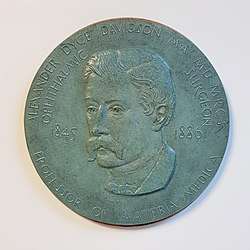Dyce Davidson
Prof Alexander Dyce Davidson MD FRSE (1835–1886) was Scottish academic and surgeon. He was Professor of Materia Medica at Aberdeen University. He was described as a "sweet and amiable character". He specialised in ophthalmic surgery.

Life
He was the only son of Rev Dr Alexander Dyce Davidson DD (1807-1872) and Elizabeth Blaikie (daughter of James Blaikie, Provost of Aberdeen).[1] He was born at their home, 34 Skene Terrace in Aberdeen, sometime in 1835.[2] His father was a prominent figure in the Free church of Scotland following the Disruption of 1843.
Dyce studied Arts and Medicine at Aberdeen University before 18 months further study in Paris. He there studied ophthalmic surgery under Xavier Galezowski and Louis-Auguste Desmarres. During this period he also acted as externe (external consultant) at several of the Parisian hospitals.[3]
He returned to Scotland around 1860, and was recognised as the foremost ophthalmic surgeon of his day, thereby acquiring a post of senior surgeon at the Blind Asylum in Aberdeen as well as senior surgeon at Aberdeen Royal Infirmary. Aberdeen University then asked him to lecture in Ophthalmic Surgery and Materia Medica (the latter initially under Prof Harvey). In 1878 he succeeded Prof Harvey as Professor of Materia Medica. He accumulated a large collection of ophthalmic instruments from around the globe (largely through correspondence).
He was elected a Fellow of the Royal Society of Edinburgh in 1885. His proposers were Charles Edward Wilson, George Chrystal, Thomas Brown, and Peter Guthrie Tait.[4]
In his latter years he lived at 224 Union Street in the heart of Aberdeen.[5]
He died an hour after an apoplectic attack in front of his students during a lecture on 22 October 1886[3]